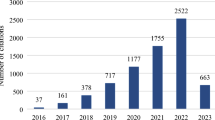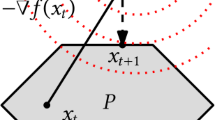Abstract
In the paper, we solve the problem of computing the maximin efficient design with respect to the class of all orthogonally invariant criteria. It turns out that on a finite experimental domain, the maximin efficient design can be computed by the methods of semidefinite programming. Using this approach, we can deal with the non-differentiability inherent in the problem, due to which the standard iterative procedures cannot be applied. We illustrate the results on the models of polynomial regression on a line segment and quadratic regression on a cube.
Similar content being viewed by others
References
Alizadeh F (1993) Interior point methods in semidefinite programming with applications to combinatorial optimization. SIAM J Optim 5: 13–51
Bušová L (2008) Computing the minimal efficiency of designs by a differentiable approximation of \({{\Phi}_{E_k}}\) -optimality criteria. Acta Math Univ Comenianae 77: 155–166
Dette H (1997) Designing experiments with respect to “standardized” optimality criteria. J Roy Stat Soc Ser B 59: 97–110
Dette H, Biedermann S (2003) Robust and efficient designs for the Michaelis-Menten model. J Am Stat Assoc 98: 679–686
Dette H, Melas VB, Pepelyshev A (2003) Standardized maximin E-optimal designs for the Michaelis-Menten model. Statistica Sinica 13: 1147–1163
Fan K (1949) On a theorem of Weyl concerning the eigenvalues of linear transformations. Proc Natl Acad Sci USA 35: 652–655
Galil Z, Kiefer J (1977) Comparison of design for quadratic regression on cubes. J Stat Plan Inference 1: 121–132
Harman R (2004) Minimal efficiency of designs under the class of orthogonally invariant information criteria. Metrika 60: 137–153
Harman R, Trnovská M (2009) Approximate D-optimal designs of experiments on the convex hull of a finite set of information matrices. Math Slovaca 59: 693–704
Heiligers B (1992) Admissible experimental designs in multiple polynomial regression. J Stat Plan Inference 31: 219–233
Imhof LA (2001) Maximin designs for exponential growth models and heteroscedastic polynomials models. Ann Stat 29: 561–576
Muller C, Pázman A (1998) Applications of necessary and sufficient conditions for maximin efficient designs. Metrika 48: 1–19
Overton ML, Womersley RS (1992) On the sum of the largest eigenvalues of a symmetric matrix. SIAM J Matrix Anal Appl 13(1): 41–45
Overton ML, Womersley RS (1993) Optimality conditions and duality theory for minimizing sums of the largest eigenvalues of symmetric matrices. Math Program Ser B 62: 321–357
Pázman A (1986) Foundation of optimum experimental design. Reidel, Dordrecht
Pukelsheim F (1993) Optimal design of experiments. Wiley, New York
Pukelsheim F, Studden WJ (1993) E-optimal designs for polynomial regression. Ann Stat 21(1): 402–415
Sturm JF (1999) Using SeDuMi 1.02, a MATLAB toolbox for optimization over symmetric cones. optimization methods and software 11-12, special issue on interior point methods (CD supplement with software) pp. 625–653
Vandenberghe L, Boyd S (1996) Semidefinite programming. SIAM Rev 38(1): 49–95
Vandenberghe L, Boyd S (1999) Applications of semidefinite programming. Appl Numer Math: Trans IMACS 29(3): 283–299
Yu Y (2010) Monotonic convergence of a general algorithm for computing optimal designs. Ann Stat 38(3): 1593–1606
Author information
Authors and Affiliations
Corresponding author
Additional information
This research was supported by ERDF-017/2009/4.1/OPVaV-CESIUK project and the Slovak VEGA-Grant No. 1/0077/09.
Rights and permissions
About this article
Cite this article
Filová, L., Trnovská, M. & Harman, R. Computing maximin efficient experimental designs using the methods of semidefinite programming. Metrika 75, 709–719 (2012). https://doi.org/10.1007/s00184-011-0348-6
Received:
Published:
Issue Date:
DOI: https://doi.org/10.1007/s00184-011-0348-6




